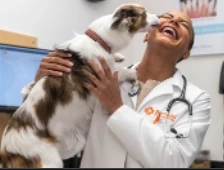Pet emergencies are inherently unpredictable. While we as pet owners do our best to keep our pets safe, they are tremendously inquisitive and clever, often to the extent of placing themselves in danger. They may eat the cake we left on the table, eat a sock, or run away from the backyard. While we could never be totally prepared for an animal hospital visit, it is crucial to understand when your pet requires immediate care.
Not all pet crises are evident, it can be difficult to determine if your pet needs emergency assistance or if you can wait until your normal vet opens in the morning. That's why we've compiled a list of the top common pet accidents that occur so you can be more informed on what a pet situation is and how to handle it. If you're unclear whether you must be seen, contact a vet near you, and an emergency physician will explain your medical questions and help you determine whether you must be seen right away.
Extreme Vomiting and/or Diarrhea
Whenever your dog or cat starts vomiting or releasing watery stool unexpectedly, it could be an indication of an underlying disease that needs to be addressed right once. A few of the causes might be fatal, so take your pet to pet emergency Boynton beach as quickly as possible.
Toxic Substance Ingestion
Toxin poisoning is unfortunately a typical reason for pets to seek the emergency veterinarian. Pets will eat a whole chocolate cake when you are not looking and will happily consume grape offered for them by their unwitting owners! You should take your pet to a veterinarian as soon as you suspect he or she has consumed a dangerous chemical. If the hazardous chemical is recognized within the first few hours of ingestion, your vet can induce vomiting to try and reduce the amount of toxic substance absorbed. Pet toxicity can cause a variety of clinical symptoms, including vomiting, diarrhea, lethargy, convulsions, and hyperactivity.
Traumatic Injuries, For Example, Being Hit By a Car
Cats and dogs are unaware of the dangers of the road. They run across with reckless abandon, particularly if they are keen on a scent and otherwise distracted. As a result, auto accidents are a common reason for emergency vet consultations. If your pet is struck by a vehicle, move them with caution because they may have had injuries that can be aggravated if not treated properly. The ideal technique to transport your pet is to carefully place them onto a flat surface, including a rubber lid to a bin or a taut towel.
Injuries to the Eyes
Cats and dogs, especially brachycephalic breeds with prominently exposed eyeballs like pugs, can easily develop eye injuries. They can't get irritants out of their eyes, and material can cause a severe ulcer. If your pet has extensive discharge, redness, squinting, or is scratching their eyes on the rug or with their paws, take them to an animal hospital delray beach fl as soon as possible.
Bite Wounds or Lacerations
Lacerations and bite marks in cats and dogs might occur as a result of a happy frolic with their dog park pals, a trip in the woods, or a contact with a wild animal. If wounds are not cleaned, washed, and occasionally sutured closed, they can get infected. Because your pet will most likely require antibiotics and pain relievers, prompt veterinary care is recommended.
Trouble Breathing
Any change in your pet's breathing is cause for concern and should be assessed by a vet as soon as possible. Breathing difficulties can be caused by heart illness, asthma, pneumonia, fluid in the lungs, or a blockage of the upper airway. If you observe your pet breathing quickly, coughing, stretching their neck and head out to breathe, or having unusual tongue colour (blue, pale, gray), take them to a palm beach veterinary hospital right away.
Consumed Foreign Object
Dogs and cats have been observed to consume nearly everything. Puppies, in particular, have a proclivity to consume inedible objects. Foreign objects could cause massive harm to the stomach and digestive tract, and if left untreated, can be fatal. Typically, an operation or endoscopy is required to remove the foreign object. Toys, rocks, clothing, and corn cobs are all common items that dogs consume. String, hair ties, and small toys are frequently swallowed by cats.


